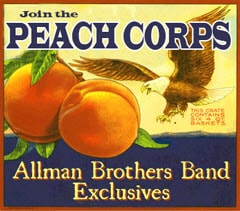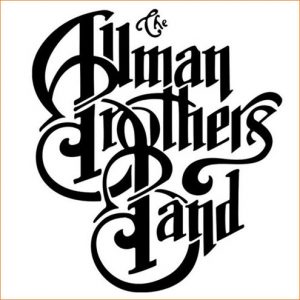By Bret Gladstone
Associated Press Newswires, 15 April 2004
HOBOKEN, New Jersey (AP) – When Warren Haynes tells you something in song, you believe it.
Haynes, frontman for Gov’t Mule and a guitarist for both the Allman Brothers Band and the Dead, is considered by many to be the hardest working man in rock and seems, whether he has become one or not, like a parental figure in music. This particularly applies to the vibrant composite known as the “jamband community,” in which Haynes is a benevolent fixture whose sense of collaboration and exploration draws the kinetic, improvisational fervor of his fellow artists into a beautiful kind of orbit.
The 40-something North Carolina native traces his musical roots to his initial infatuation with gospel and soul, with some of music’s most emotive voices — Wilson Pickett, Otis Redding, Smokey Robinson, Levi Stubbs. Their testimonial spirit is captured in the nakedness of Haynes’ live performances, which yield moments like a moving “Patchwork Quilt” solo during a recent performance at The Starrland Ballroom in Sayreville, a duet between Haynes’ voice and his instrument.
“The beautiful thing about the human voice,” Haynes explained recently before a session at Hoboken’s Water Music Studios, where Gov’t Mule is recording a new album, “is there’s a thousand notes in between, and it allows for much more expression, because everyone feels that differently. All my favorite players were players that emulated singers … Maceo Parker playing saxophone, Little Walter playing the blues harmonica, it’s like they were singing through their instruments, and that to me is the most expressive way that you can approach your playing.”
Yet Haynes’ soul influences are tempered by his command of a gritty, blues-based guitar sensibility reminiscent of an Eric Clapton, Stevie Ray Vaughn or John Lee Hooker, and a consciousness which seems at times to be some endearing composite of the thousand nameless, smoke filled nightclubs of the South.
Haynes possesses what is in many ways the ideal rock and roll voice, at once gravelly, booming, and delicate, soulful enough to maintain his emotional peaks and raw enough to accommodate the themes of death, perseverance, and internal struggle that permeate his work. There is an overwhelming feeling of validity to Haynes performance, a truth borne marginally from his delivery, but more profoundly from the brilliance of his songwriting. His work strikes at the bruising instabilities and contradictions that comprise existence, at simultaneous attraction and repulsion. Haynes’ lyrics maintain a kind of balance, refusing to let their light and dark themes — love and loss, life and death, weariness and endurance — separate from each other, instead binding them and grasping desperately at the dwindling tradition of meaningful stories in music.
“That aspect,” Haynes says, “comes from a lot of different areas, mostly my love of songwriting. Starting with Bob Dylan, who, I think most people would agree is the pinnacle, but also studying Neil Young, Roger Waters, Elvis Costello, Joni Mitchell, Tom Waits, all the great singer songwriters I grew up around in Carolina. If you keep your aspirations high, you’re going to constantly strive to write something more than stupid love songs. A lot of people sit down and write songs, but don’t really believe what they just wrote, and I don’t want to be one of those songwriters: ‘Everything’s perfect, you’re the love of my life,’ and you’ve said it all in the first line, and there’s no story.”
Yet ultimately, the complete effect of Haynes’ songs is in the way these lyrics are immersed in the virtuosity of his play, his ability to produce that utterly appropriate and unusual chord, the one with just the kind of open- ended dissonance that captures the sadness and subtle, moving hope that characterizes songs like “Beautifully Broken”:
“She’s so beautifully broken / You can barely see a flaw / Especially from a distance / Which is always how I fall / Why do I fall for the dangerous ones / The ones that never learn to let go / Why do I lie to myself / Pretend that I can break her / When she’s already been so beautifully broken.”
As a result, if one hears Gov’t Mule launch into, as they have, The Bee Gees “To Love Somebody,” Van Morrison’s “Into the Mystic,” Greene’s “Take Me to the River” or Pink Floyd’s “Comfortably Numb,” and then scampers the next day to a CD to recapture the moment, something will be missing.
“I’ve definitely maintained that there’s music that you can make in front of a crowd that you can’t make any other way,” Haynes says. “That energy, you’re feeding it to them, they are feeding it back to you, and it’s just this constant thing that’s growing, and as much as I love making studio records, you can never achieve that.”
This is the dichotomy that provides Haynes with his own unique electricity, injecting life into the esoteric spaces left by Garcia in a Dead no longer Grateful and an Allman Brothers Band short one virtuoso brother and looking to reassert its revered place in rock. Yet despite the immense vacuums left by such icons, Haynes has preserved his own distinct presence amid the mythical quality of each band.
“I don’t think I’d be nearly as good a guitar player today if I hadn’t been working with Warren,” Dickey Betts, the former Allman Brothers member, told Guitar World magazine. “Everybody thought I was crazy for wanting to get him in the band. All the business people said, ‘Are you sure you want him? He…uhh…’ They wouldn’t quite say it, so I asked, ‘Are you afraid he’s going to blow me away?’ And they said, ‘He’s awfully good. Are you sure you want to deal with that?’ And I said, ‘I don’t want to get some … lackey in the band. We might as well not have another guitarist.’ I have to work like hell to keep up with Warren, and he drives me to play things that I wouldn’t otherwise.”
“When I joined the Allmans,” Haynes notes, “I was always told, ‘Play like you, it’s up to you how much Duane Allman you want to bring to the table.’ And it’s the same kind of thing in the Dead so far, they seemed to be into leaving it up to me and (fellow guitarist) Jimmy Herring how much Jerry Garcia we want to bring to the table.”
Phish bassist Mike Gordon, who directed the documentary “Rising Low,” which in part detailed Gov’t Mule’s “Deep End” project that rotated some of the world’s great bass players through the band, is amazed by Haynes’ combination of discipline, maturity and humility. “Bringing that together is what really gets me,” Gordon said in an interview. “I mean now he’s playing in five bands, if you count solo acoustic, and he’s just always got albums, DVDs in the works (including the June 8 release of the “Live at Bonnaroo” CD on ATO Records), he’s writing songs for all those bands, and at the same time has his head on his shoulders and is a very nice, sweet-natured person who is easy to talk to, and that’s unique.”
“The best you can ever approach your music is without ego and without pretense,” Haynes says. “To me the best you can ever perform is when you forget you’re performing at all. These are rare times. You can probably count them, well, on four hands, where I’ve gotten so lost in the music that I’ve almost felt that it was an out-of-body experience and completely forgotten that I was on stage performing and then I don’t realize it until I come back and go out on stage and go, ‘Wow , I’m on stage performing music.'”
Before finally retreating into the sanctuary of the studio, Haynes is asked what he loves about music. He grins and slips back into his comfortable southern drawl, his answer sounding almost lyrical:
“Everything,” he says. “Duane Allman said, ‘There’s nothing bad about music.’ And even though there’s a lot of bad music, to someone, it means everything in the world. So even though there’s music that I hate, someone loves it, and it does to them what music that I love does to me. One of the main things I love about music is that nobody can tell you what to like. It’s yours.”
(c) 2004. The Associated Press. All Rights Reserved.



